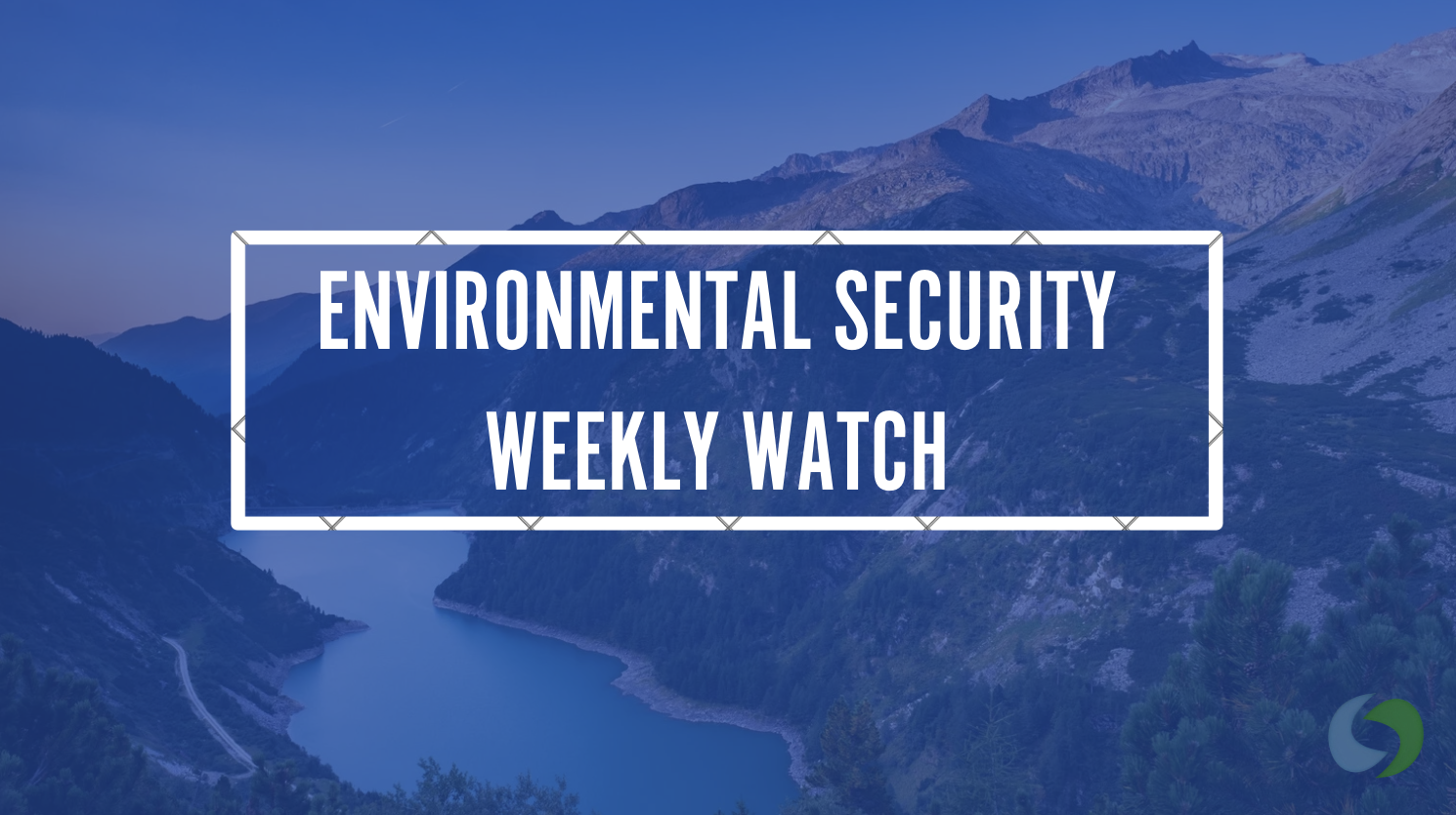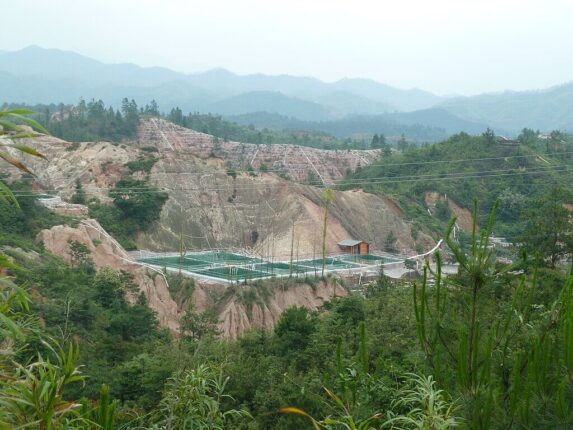-
Environmental Security Weekly Watch: November 17-21, 2025
›November 21, 2025 // By Madelyn MacMurrayA window into what we’re reading at the Stimson Center’s Environmental Security Program
As COP30 Concludes, Experts Call for Reform (Reuters)
Interviews with experts attending COP30 highlight a growing movement for reform to the UN climate negotiations. In particular, there is alignment on a key critique of the current COP structure which calls for a full consensus of nearly 200 countries to make decisions. Since this requirement historically has allowed more ambitious efforts to be blocked during negotiations, suggestions for reform have included the following: a shift to a majority-vote model, holding COP every other year, convening smaller action-focused gatherings, and downsizing COP to exclude big business contingents.
-
Environmental Security Weekly Watch: October 27-31, 2025
›A window into what we’re reading at the Stimson Center’s Environmental Security Program
Revisions to Indonesian Law Promote Unregulated Mining (The Diplomat)
Since gold was discovered in 2011 on Mount Botak in Indonesia, thousands of miners have flocked to the area without official permits. It is an influx which has transformed this northeastern region from an agricultural center into a hub of small-scale, unregulated mining. Uncontrolled use of mercury and cyanide has severely polluted local rivers, with mercury levels in the Waekase River reaching 0.05 mg/L—or 50 times the WHO’s safety threshold. Yet despite the government’s move to close the mine in 2015, illegal activity continues. Ineffective law enforcement has caused ecosystem destruction, public health threats (including neurological disorders and kidney damage) and deadly conflicts between residents.
-
Environmental Security Weekly Watch: September 29 – October 3, 2025
›A window into what we’re reading at the Stimson Center’s Environmental Security Program
Nickel Mining Threat to New Raja Ampat UNESCO Biosphere Reserve (Mongabay)
When Indonesia’s Raja Ampat archipelago received a UNESCO Biosphere Reserve designation on September 27, 2025, the new designation adding to the status it won as a Global Geopark in 2023. Yet this dual honor highlighting the archipelago’s exceptional biodiversity is now under threat from intense pressure from global demand for nickel for electric vehicle batteries that is challenging the reserve’s conservation goals.
-
Environmental Security Weekly Watch: September 15-19, 2025
›
A window into what we’re reading in the Stimson Center’s Environmental Security Program
Mexico’s Mercury Boom is Poisoning People and the Environment (Associated Press)
In Mexico’s Sierra Gorda mountains, soaring international gold prices also have created a mercury boom. Since 2011, mercury prices have skyrocketed from $20 per kilogram to between $240 and $350 per kilogram today. Most of Mexico’s mercury is trafficked to Colombia, Bolivia, and Peru for use in illegal Amazon gold mining operations that contaminate rivers and ecosystems. Yet the country’s adoption of a 2017 UN convention banning mercury mining and exports also allows artisanal mines to operate until 2032.
-
Environmental Security Weekly Watch: September 1-5, 2025
›
A window into what we’re reading at the Stimson Center’s Environmental Security Program
Chinese Company Accused of Covering Up Extent of Major Toxic Mining Spill in Zambia (Associated Press)
In February, a dam collapse at Chinese-owned Sino-Metals Leach Zambia copper mine released toxic waste into the Kafue River, which provides water for over half of Zambia’s 21 million people. An independent investigation by South African company Drizit found that 1.5 million tons of toxic material were released in the spill, which is 30 times more than Sino-Metals admitted to spilling. When Drizit’s investigation was set to reveal extensive contamination verified through 3,500 samples, Sino-Metals terminated their contract one day before the final report was due.
-
Environmental Security Weekly Watch: August 11-15, 2025
›
A window into what we’re reading at the Stimson Center’s Environmental Security Program
The Mining Town Funding Congo’s Rebels and Tech Giants (Reuters)
In April 2024, the M23 rebel group seized control of Rubaya, a mining town that produces 15% of the world’s coltan—a critical mineral worth used in mobile phones, computers, and aerospace components. Rebels imposed a parallel administration in the town, and placed a 15% tax on mineral traders that generates $800,000 monthly from levies. Thousands of impoverished miners in the town, however, still work 12-hour shifts in dangerous conditions earning just $5.15 per day.
-
Northern Myanmar’s Rare Earths Are Shaping Local Power and Global Competition
›August 4, 2025 // By Amara Thiha
This article is adapted from “Rare Earths and Realpolitik: Kachin Control, Chinese Calculus, and the Future of Mediation in Myanmar,” written by Amara Thiha for the Stimson Center.
As global powers race to secure critical minerals, Myanmar’s rare earths have emerged as both prize and flashpoint. Last week, Reuters reported that the Trump administration has been privately reviewing competing proposals to access Myanmar’s heavy rare earth minerals, including potential engagement with Myanmar’s military junta and direct negotiation with the Kachin Independence Army (KIA), an ethnic armed group that now controls key extraction sites. Since the February 2021 military coup, rare earth mining has surged in northern Kachin State near the Chinese border, where the KIA has seized highly valuable rare earth mines and a critical corridor in the global supply chain. What began as a local insurgency has evolved into resource-backed diplomacy, drawing in China, India, and now the United States.
-
Environmental Security Weekly Watch: July 21-25, 2025
›
A window what we’re reading at the Stimson Center’s Environmental Security Program
Community Patrols Offer a Blueprint to Enforcement of Conservation Law (Mongabay)
In the remote reaches of the Brazilian Amazon, an experiment in grassroots enforcement is yielding results. The Voluntary Environmental Agents Program, which trains and funds residents to patrol their own territories, has reduced illegal fishing, hunting, and logging by 80%. Operating in the Mamirauá and Amanã reserves, the program equips communities with surveillance tools, environmental education, and leadership training, weaving traditional knowledge into conservation efforts.
Showing posts from category mining.







